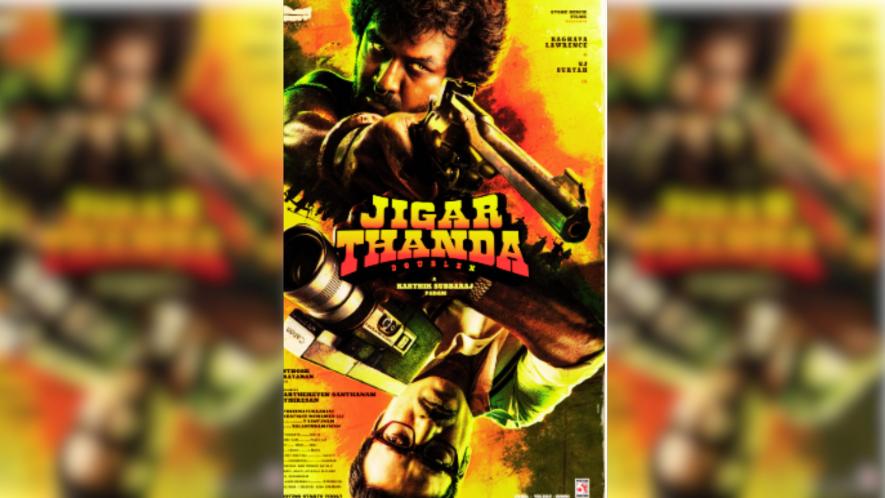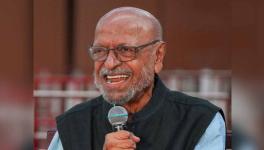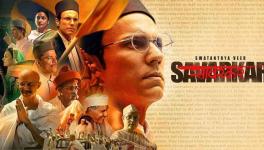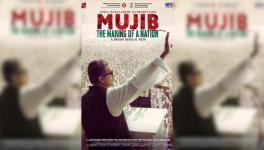In Times of Blockbuster Hits Like 'Animal', a Review of 'Jigarthanda Double X'

Image Courtesy: Twitter/@karthiksubbaraj
Karthik Subbaraj's Jigarthanda Double X is a thought-provoking movie that all filmmakers and cinema lovers should watch. It is a movie that shows love for the art of cinema and its importance today. It is a film that at no point fails to entertain, does not lag anywhere, keeps the audience engaged with its well-nurtured plot twists and fighting scenes and conveys a larger political message about the ruling class's control over narratives and a film's power to tackle it.
The story is set in early 1970s Madurai, where a police officer named K. Rathnakumar (Naveen Chandra) is stationed in a forest to capture a miscreant troubling the local forest tribe 'Shettani' who illegally hunts tuskers. Whilst in his endeavour to capture Shettani, Rathnakumar, to help his brother's political ambitions, set on a side mission to kill four important people who are the support system of his brother's political rival. He recruits four prisoners to do this task. One of them, Kirubai (SJ Suryah), an innocent man in prison, is assigned to kill Allius Caesar (Raghava Lawrence), the biggest gangster in Madurai. Kirubai, with the help of his nephew, plots to kill Caesar by pretending to be a filmmaker and cashing on Caesar's desire to become the first dark-skinned Tamil film hero.
This follows the rollercoaster ride of mass dialogues, music and plot twists. Starting from Kirubai's entry into Caesar's life and constantly finding himself unable to kill him while being pressured by the despicable cop Rathnakumar to the intermission point where he resolves to kill Caesar but through the weapon that he holds in his hand- the film camera. He decides to make Caesar dance to his tunes and completely rejects the biopic of Caesar they were making till that point. He tells him they need to restart this story by making Caesar a Messiah Gangster. For that purpose, he would have to do good things that he can film and suggest that he should set out on the endeavour to kill Shettani and free the people of his native tribe from the clutches of the ruthless police officer.
Until now, Kirubai believes that this battle between Caesar and Shettani will end in Caesar's demise, but when it does, Kirubai decides to save Caesar. This continuous change of emotions and ethical dilemmas of the two characters portrayed in the film is owed to the filmmaking process that both Kirubai and Caesar are involved in, depicted excellently by Subbaraj. Making a film about filmmaking is one of the most difficult feats. Mixing entertainment and strong political views is one of the toughest feats, but the film does exactly that.
Subbaraj shows how involved people are in their own lives; even the heroes realise how systematic exploitation works and how the ruling class constantly uses them as puppets to achieve their goals. As Kirbuai goes on to shoot his fake film with Caesar, it turns out that the art of filmmaking is the true liberator for Caesar, Kirubai and all the people living in the forest of Kombai Sambala. And to achieve this liberation, the camera is the only weapon used. Throughout the film, Kirbuai's camera is pitched against Caesar's gun to metaphorically show how they are equally strong weapons. Still, at the end of the film, the people give up guns and other weapons and accept the camera as the only true weapon. Even though the film has a tragic end where, on the Chief Minister's orders, the police open fires at the tribal people of Kombai Sambala forest, killing everyone, including Caesar, the larger battle is won by exposing the truth about this secret police operation by releasing the final film shot on the most important weapon - the camera.
At the end of Kirubai's film, Caesar is appealing to the audience to go and ask the ruling class, "Oh Rulers, Why?" Leaving the audience in rage against the ruling party and demanding answers as to why they killed their brothers, sisters, relatives, and elders from the forest. What did they get out of completely wiping out a whole village of identity-less people?
It is quite evident that Subbaraj made this film to express his love for the art of filmmaking itself whilst showing a clear evolution of his political ideas and the expression of those ideas in his art. Both Suryah and Lawrence do an excellent job while playing their roles. Both had a great challenge: the complete change of character as to what they were in the beginning of the movie and what they became in the end. Both of them handle this kind of character development flawlessly without any abrupt change.
Why A Jigarthanda Double X Review?
I felt the need to review this film almost a month after its release due to another recently released film that is a blockbuster hit, running houseful across Delhi these days, Sandeep Reddy Vanga's masterpiece - Animal, starring Ranbir Kapoor. It is a masterpiece only in the eyes of Sandeep Reddy Vanga and his cult followers and young, immature boys. It is a three-hour-long, headache-inducing film that has no substance, politically or cinematically.
It is almost a far-fetched idea to expect any good political content from Vanga's Animal, but one could have expected something good cinematically. Still, the film fails to deliver even that. It is quite clear that mass entries and arousing BGMs are not enough to make a good film. It has to have some content, plot, story, or editing that makes sense to the audience.
How Animal did so well in box office collections is still a mystery, and deeper research should occur to understand this phenomenon. It can be attributed to marketing, advertising, social media hype, etc, but it is not an enjoyable film. Vanga and many people defending his film say that movie critics must learn about film appreciation rather than just criticising something. What the critics and audience feel can be vastly different. We see many people going crazy about the film on social media. But the truth be told from the inside of Amba cinema, one frequented largely by working-class people, which had housefull shows for almost two weeks after the release of the film. The audience in Amba goes completely wild at the beginning of the film, with hoots and cheers and a crass comment by a boys' group occasionally. But as the movie progresses, the hooting goes down to a complete halt. In the film's second half, there is barely a cheer, and it is quite evident from people's faces that they are just waiting for this overextended melodrama to end. Most people were waiting for the Ranbir vs Bobby Deol fight, which was quite underwhelming.
From this observation, the arguments about the people enjoying the film also falter. People might be forcing themselves to like this film as there isn't another mass film like this in Bollywood, and people, especially men, love to imagine themselves as a mass protagonist. Still, simultaneously, the audience in the large hall of Amba stepped outside with a disappointed face.
Vanga wrote, edited, and directed this movie himself, but it is evident that he failed to do any of that successfully in this film. The story he wrote wasn't engaging. The film is lengthy, as some have compared it to Martin Scorcese's Killers of the Flower Moon because Vanga doesn't know how to cut the film. Even if the movie had ended at the interval, it would have conveyed the same point as it did in the end with completely unnecessary overlays. And the fact that he has so much faith in his end product also makes him a bad director. The film has good cinematography, kudos to Amit Roy, and a good soundtrack. Some fight scenes are good but clearly could have been better. The axe fighting scene, which I like most about the film, also looked bleak compared to when I saw the axe fighting scene in Jigarthanda Double X.
I went to watch Animal in a cinema hall and then came back home and watched Jigarthanda Double X on Netflix to redeem my day, and honestly, it was redeemed. Before, at Ram Gopal Verma's request, Vanga started taking film appreciation classes, it would be best for people to start watching films like Jigarthanda in comparison and realise what kind of cinema is to be appreciated.
Get the latest reports & analysis with people's perspective on Protests, movements & deep analytical videos, discussions of the current affairs in your Telegram app. Subscribe to NewsClick's Telegram channel & get Real-Time updates on stories, as they get published on our website.
























